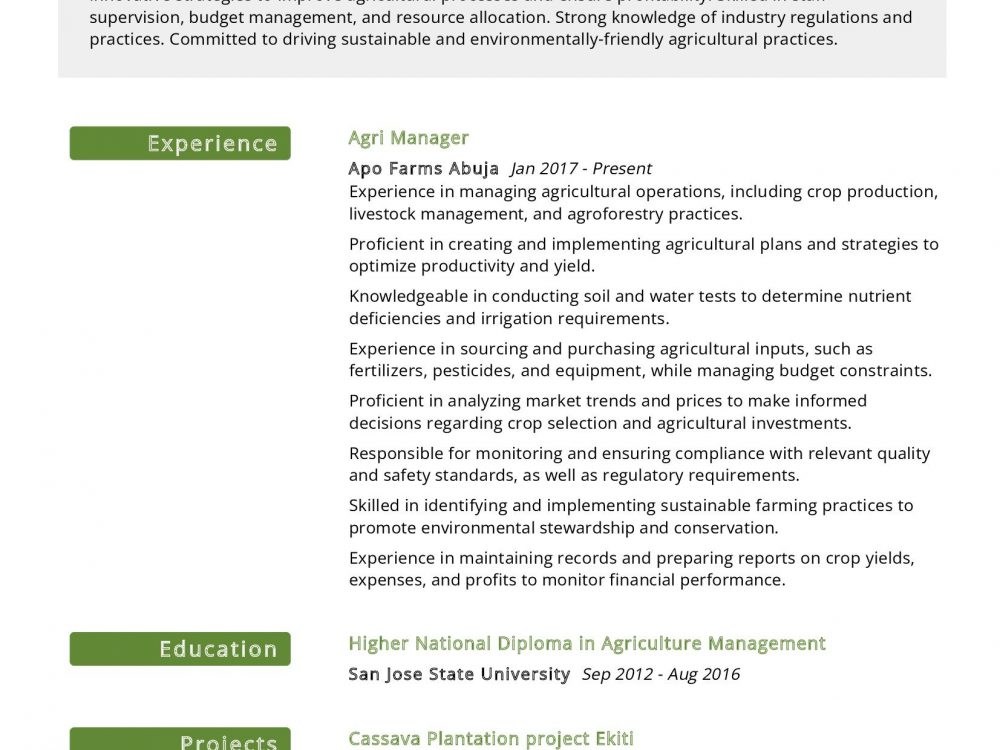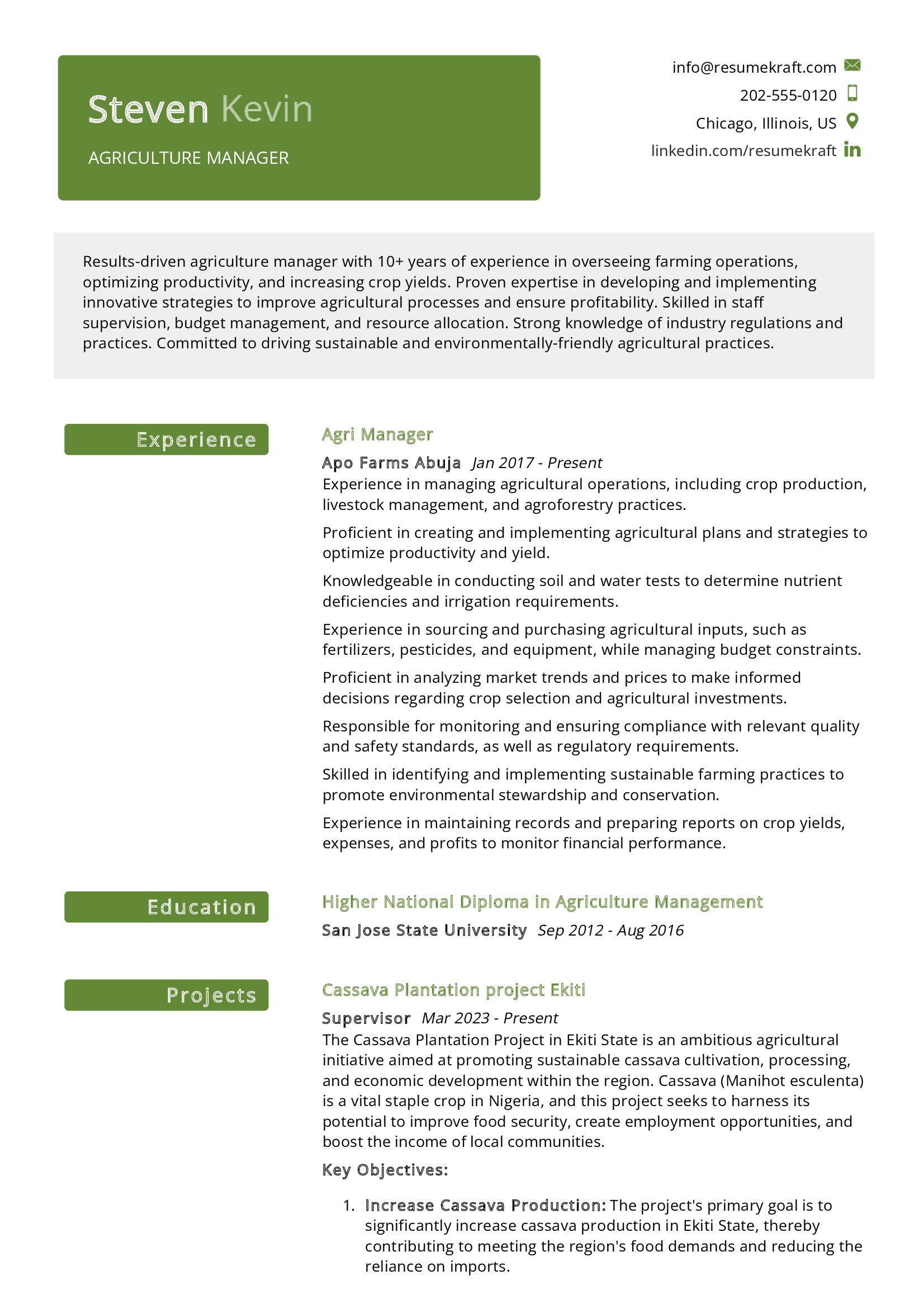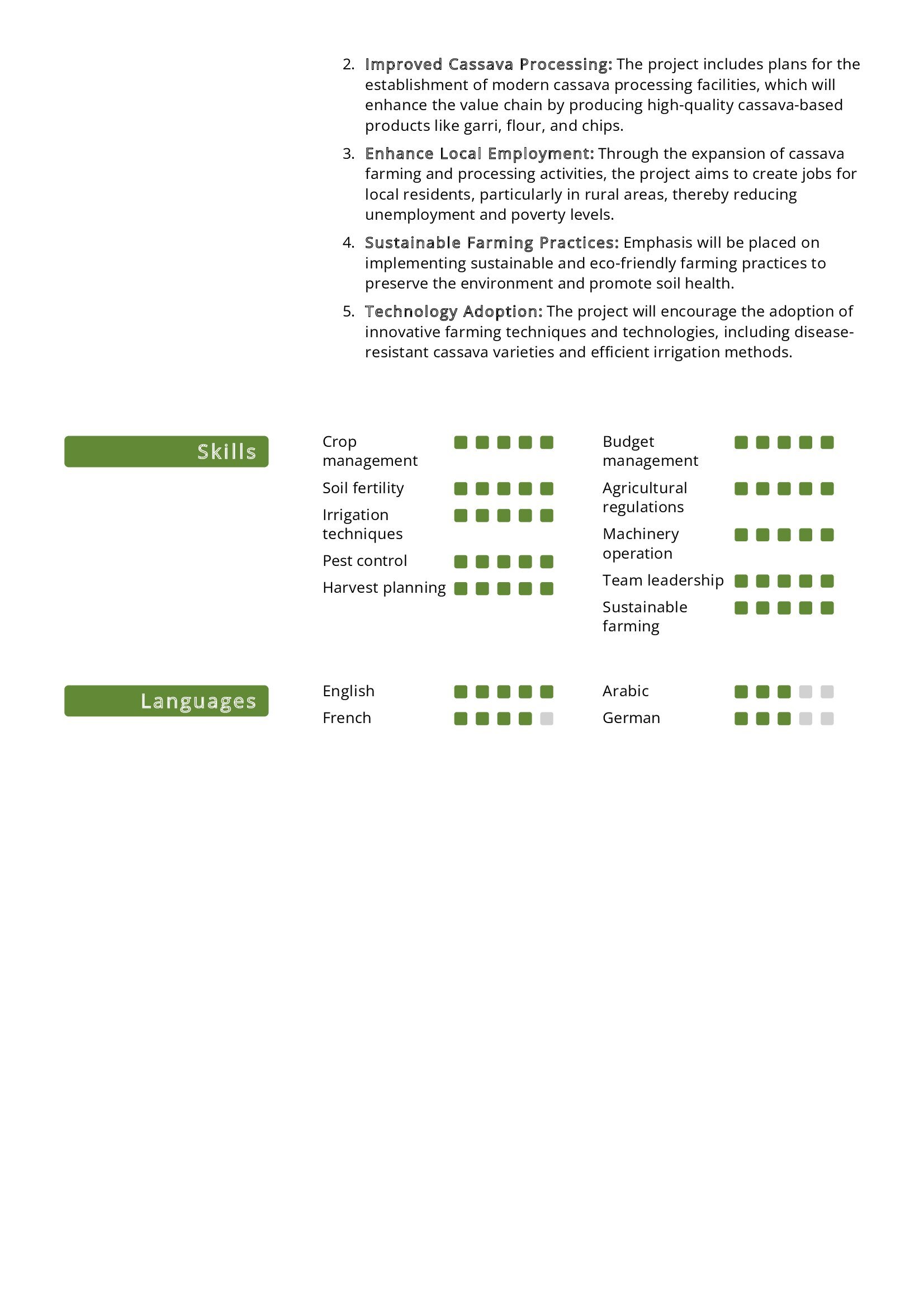The Role of an Agriculture Manager
Agriculture is the backbone of our society, providing us with the food and resources we need to thrive. At the heart of this vital industry is the Agriculture Manager, a dedicated professional responsible for overseeing various aspects of farming operations. In this article, we will delve into the multifaceted role of an Agriculture Manager, exploring the job requirements, responsibilities, and tips for creating an impressive resume in this field.
Job Requirements for an Agriculture Manager
Stepping into the role of an Agriculture Manager is a journey that demands a unique set of skills and qualifications. To thrive in this position, one must meet specific job requirements that showcase a deep understanding of agriculture and effective management skills. Here are the prerequisites for aspiring Agriculture Managers:
- A Bachelor’s degree in Agriculture, Agricultural Business, or a related field, providing a strong foundation in agricultural principles.
- Extensive knowledge of crop cultivation, livestock management, and sustainable farming practices.
- Experience in agricultural management or farm operations, demonstrating the ability to oversee and optimize farming activities.
- Strong leadership and team management skills, honed through practical experiences and possibly through relevant courses or training programs.
- Proficiency in agricultural technology and equipment, essential for modern farming operations.
- Excellent communication skills to effectively collaborate with farm workers, suppliers, and stakeholders.
- An understanding of agricultural regulations and compliance, ensuring that farming activities adhere to legal and environmental standards.
- Adaptability and problem-solving abilities, crucial for addressing challenges in the ever-changing agricultural landscape.
Continuing education and training in agriculture can further enhance one’s qualifications and competitiveness in the job market.
Responsibilities of an Agriculture Manager
The role of an Agriculture Manager is diverse and challenging, requiring a deep understanding of agricultural practices and effective management strategies. Let’s explore the core responsibilities that define this vital position:
- Planning and overseeing crop production, including selecting crops, managing planting schedules, and ensuring optimal yields.
- Supervising livestock operations, including animal health, feeding programs, and breeding activities.
- Managing farm resources, such as land, equipment, and labor, to maximize efficiency and productivity.
- Implementing sustainable farming practices to protect the environment and promote long-term agricultural viability.
- Monitoring and maintaining the health and quality of crops and livestock, taking preventive measures against diseases and pests.
- Collaborating with suppliers to procure necessary inputs, such as seeds, fertilizers, and equipment, while optimizing costs.
- Ensuring compliance with agricultural regulations and safety standards, as well as maintaining records for inspections and audits.
- Managing a team of farm workers, providing training, guidance, and motivation to achieve farming goals.
- Staying updated on the latest agricultural advancements and technologies to enhance farm operations.
Each responsibility requires a unique skill set, making the Agriculture Manager a pivotal figure in the success of farming endeavors.
Creating a Strong Agriculture Manager Resume
Your resume is your gateway to securing a rewarding position as an Agriculture Manager. To stand out in the competitive job market, consider the following tips for crafting an impressive resume:
- Highlight your leadership roles, showcasing instances where you have effectively managed agricultural operations and led teams to success.
- Detail specific farming initiatives you have spearheaded, such as implementing sustainable practices or achieving significant yield improvements.
- Include metrics to quantify your achievements, such as increased crop yields, reduced operational costs, or improved livestock health.
- List relevant certifications or training programs related to agriculture and management, demonstrating your commitment to continuous learning.
- Personalize your resume for each job application, tailoring your qualifications and experiences to match the specific job requirements.
Your resume is your opportunity to showcase your expertise and passion for agriculture management, so make it compelling and authentic.
Agriculture Manager Resume Summary Examples
Your resume summary serves as the introduction to your career story as an Agriculture Manager. Here are some examples to inspire you:
- “Experienced Agriculture Manager with a Bachelor’s degree in Agricultural Business and a proven track record of optimizing crop yields and implementing sustainable farming practices for over 10 years.”
- “Dedicated Agriculture Manager with expertise in livestock management, recognized for achieving 20% improvement in animal health and breeding success rates.”
- “Passionate Agriculture Manager with a commitment to environmental sustainability, skilled in maximizing crop production while minimizing ecological impact.”
Your resume summary should encapsulate your unique strengths and experiences as an Agriculture Manager.
Educational Background for Your Agriculture Manager Resume
Your educational background is a crucial aspect of your resume, showcasing your academic qualifications and knowledge in the field of agriculture. Here’s how you can list your educational milestones:
- Bachelor of Science in Agriculture, XYZ University, where I gained in-depth knowledge of crop management and sustainable farming practices, graduated in 2012.
- Master of Agricultural Business Management, ABC University, where I honed my managerial skills and understanding of agricultural economics, completed in 2016.
- Certified Agriculture Professional (CAP) certification, demonstrating my commitment to continuous learning and expertise in agricultural management, obtained in 2018.
Your educational qualifications are the foundation of your expertise as an Agriculture Manager.
Essential Skills for an Agriculture Manager Resume
Your skill set is your toolkit, equipped with the abilities you’ve developed over the years. Here are the essential skills that an Agriculture Manager should possess:
Soft Skills:
- Leadership and team management, vital for guiding farm workers and achieving farming goals.
- Communication and interpersonal skills, necessary for effective collaboration with suppliers, team members, and stakeholders.
- Problem-solving abilities, crucial for addressing challenges in crop production, livestock management, and resource allocation.
- Attention to detail, essential for maintaining the health and quality of crops and livestock.
- Adaptability and resilience, vital for navigating the dynamic nature of agriculture and responding to unexpected situations.
Hard Skills:
- Crop cultivation expertise, including knowledge of planting, irrigation, pest control, and harvesting techniques.
- Livestock management skills, encompassing animal health, feeding, breeding, and overall care.
- Farm resource management, including land, equipment, labor, and budget allocation.
- Understanding of agricultural technology and equipment operation, essential for modern farming practices.
- Knowledge of agricultural regulations and compliance, ensuring adherence to industry standards and legal requirements.
Each skill in your toolkit contributes to your effectiveness as an Agriculture Manager.
Common Mistakes to Avoid When Writing an Agriculture Manager Resume
As you craft your resume, it’s important to avoid common pitfalls that can hinder your job search. Here are some mistakes to steer clear of:
- Using a generic, one-size-fits-all resume that doesn’t highlight your specific qualifications for each job application.
- Focusing solely on job duties rather than showcasing your achievements and contributions in previous roles.
- Overlooking the importance of a well-crafted cover letter, which provides a personalized introduction to your candidacy.
- Overloading your resume with technical jargon that may not be familiar to all readers; use clear and concise language.
- Failing to proofread your resume, which can leave a negative impression and suggest a lack of attention to detail.
Avoiding these mistakes will help you create a resume that effectively communicates your qualifications and professionalism.
Key Takeaways for Your Agriculture Manager Resume
As we conclude this comprehensive guide to crafting an Agriculture Manager resume, remember these key takeaways:
- Emphasize your leadership and management skills, showcasing your ability to oversee farm operations effectively.
- Highlight your expertise in crop cultivation, livestock management, and sustainable farming practices.
- Provide specific examples of achievements and quantifiable results from your previous roles.
- Include relevant certifications and training programs to demonstrate your commitment to continuous learning.
Your resume is your ticket to a rewarding career as an Agriculture Manager, so make it a true reflection of your skills and passion for agriculture.
Finally, feel free to utilize resources like AI Resume Builder, Resume Design, Resume Samples, Resume Examples, Resume Skills, Resume Help, Resume Synonyms, and Job Responsibilities to create a standout application and prepare for the Agriculture Manager job interview.



